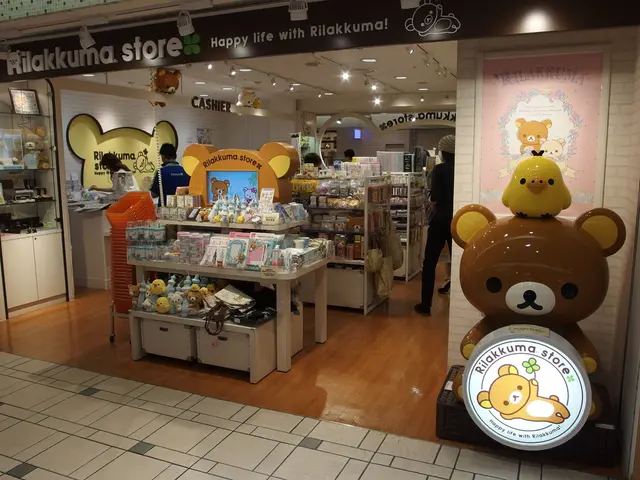Crafting a personal brand: Steps to develop a private label
Breathing New Life into Retail: The Power of Private Labels
Retail giants often find themselves in a rut, striving for change - and no magic formula is apparent, aside from the occasional mention of tech upgrades or store renovations. However, one strategy that's garnering attention among industry insiders is the development of private labels. Key retailers, such as Target, have reached new heights by embracing their own brands, and others are eager to learn their secrets.
The most successful retailers, such as Target, boast a vast array of exclusive brands in various sectors, including apparel, home goods, consumer products, and food. Several of these brands generate an impressive $1 billion or even $2 billion annually. Unraveling the secrets behind Target's success has led competitors to court its private label experts. Macy's has even hired key Target designers and merchants directly or via contract.
Bed Bath & Beyond seemed poised to capitalize on this knowledge, luring Target's top executive in the private label space, Mark Tritton. Despite these efforts, their home goods retailing empire succumbed to bankruptcy last year, leaving online furniture retailer Overstock in control of the brand name but not the stores.
Jeffrey Sward, founding partner of Merchandising Metrics, commented on the missteps, stating that private label success requires more than mere replication of popular national brands. Instead, a well-crafted brand story, built over time, is essential to win customers' trust and lure them away from established brands.
The Goldmine of Private Labels
Target's private label sales have soared, with approximately one-third of their revenue attributed to their owned brands, as reported in their 2022 annual report. Similarly, Costco's Kirkland Signature private brand claims a 28% share of their total merchandise. Both retailers attribute their private labels to improving margins, sales, and customer satisfaction.
Target boasts that their private brands enjoy higher margins than national brands, while differentiating the retailer in the market. However, the company acknowledges that private brands carry risks, including supply chain disruptions and shifting consumer preferences.
The Making of a Private Label
Target approaches private label development as a comprehensive brand launch, not just a quick label slapped on items. Lee Peterson, a retail veteran, emphasizes the need to allocate resources for sourcing, fabric buying, and supply chain management. Liza Amlani, a retail strategy consultant, agrees, pointing out the importance of tailoring assortments to customer insights and paying attention to visual merchandising for a seamless customer experience.
Rimi Gill, another retail strategy consultant, stresses the importance of timing, suggesting that an inopportune launch could jeopardize a brand’s success.
Macy's Resurgence
While Bed Bath & Beyond struggled to capitalize on its private label push, Macy's may find success. Macy's unveiled its first label developed by ex-Target merchants, On 34th, in February 2020. On 34th is a differentiated women's apparel collection, representing a serious attempt to launch a lifestyle brand. However, patience remains crucial, as success will take time to materialize, especially with thorough implementation across multiple Macy's stores.
- The pandemic, climate change, and geopolitical conflicts pose risks for retail's private label sector, requiring constant upgrading and adaptability in the industry.
- Space exploration, AI, and digital innovation in retail can offer new sourcing opportunities and emerging trends for private label development.
- Target's success with private labels has prompted fashion’s trendsetting world to take notice, as industry analysts predict a shift towards more unique, exclusive styles in retail.
- Policymakers and trade organizations are closely observing the impact of private labels on domestic and global trade, as well as their role in fostering competition and consumer protection.
- Sports apparel and accessory brands have shown growing interest in releasing private labels, reflecting the increasing importance of lifestyle choices and personal branding in sports culture.
- Finance and investment firms have taken a keen interest in the retail sector, eying private labels as lucrative opportunities for long-term growth and returns.
- Collins Aikman, a valued auto parts supplier, recently underwent restructuring to invest in upgrading private label lines, promising higher-quality products and greater market differentiation.
- The retail industry is seeing a surge in sustainable and eco-friendly private labels, as consumers tend to favor brands that prioritize climate-conscious practices and sustainable sourcing.
- Policy reforms aimed at reducing risks and ensuring fair competition in the retail sector could potentially pave the way for a cost-effective supply chain, benefiting private label manufacturers and consumers alike.
- Precise timing, differentiated branding, and customer-centric marketing strategies will tend to guarantee the success of private labels in the intensely competitive retail landscape, as demonstrated by numerous case studies.








